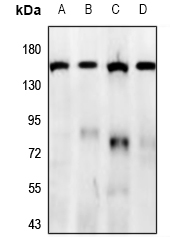Product Name :
GPR158 polyclonal antibody Background :
G-protein coupled receptor 158 (GPR158) is a receptor belonging to the Class C GPCR family. It lacks the extracellular Venus flytrap module characteristic of the known members of that family and instead contains two other elements that are not typical of the class: a calcium-binding EGF-like domain and a leucine repeat region. The mature extracellular domain of human GPR158 contains 393 amino acids (aa) and shares 89% identity with both mouse and rat GPR158. GPR158 is expressed at the highest level in the brain, but also in a variety of other tissues including retina, spleen, liver and lung. GPR158 was originally identified in functional screens linked with biological stress and has been implicated in the osteocalcin effect on cognitive processes in the brain, and glaucoma and cancer in the periphery. Product :
Rabbit IgG, 1mg/ml in PBS with 0.02% sodium azide, 50% glycerol, pH7.2 Storage&Stability :
Store at 4°C short term. Aliquot and store at -20°C long term. Avoid freeze-thaw cycles. Specificity :
GPR158 polyclonal antibody detects endogenous levels of GPR158 protein. Immunogen :
Synthetic peptide, corresponding to Human GPR158. Conjugate :
Unconjugated Modification :
Unmodification
GPR158 polyclonal antibody Background :
G-protein coupled receptor 158 (GPR158) is a receptor belonging to the Class C GPCR family. It lacks the extracellular Venus flytrap module characteristic of the known members of that family and instead contains two other elements that are not typical of the class: a calcium-binding EGF-like domain and a leucine repeat region. The mature extracellular domain of human GPR158 contains 393 amino acids (aa) and shares 89% identity with both mouse and rat GPR158. GPR158 is expressed at the highest level in the brain, but also in a variety of other tissues including retina, spleen, liver and lung. GPR158 was originally identified in functional screens linked with biological stress and has been implicated in the osteocalcin effect on cognitive processes in the brain, and glaucoma and cancer in the periphery. Product :
Rabbit IgG, 1mg/ml in PBS with 0.02% sodium azide, 50% glycerol, pH7.2 Storage&Stability :
Store at 4°C short term. Aliquot and store at -20°C long term. Avoid freeze-thaw cycles. Specificity :
GPR158 polyclonal antibody detects endogenous levels of GPR158 protein. Immunogen :
Synthetic peptide, corresponding to Human GPR158. Conjugate :
Unconjugated Modification :
Unmodification
-
 Western blot (WB) analysis of GPR158 polyclonal antibody at 1:500 dilution LaneA:BV2 whole cell lysate LaneB:PMVEC whole cell lysate LaneC:A549 whole cell lysate LaneD:HepG2 whole cell lysate
Western blot (WB) analysis of GPR158 polyclonal antibody at 1:500 dilution LaneA:BV2 whole cell lysate LaneB:PMVEC whole cell lysate LaneC:A549 whole cell lysate LaneD:HepG2 whole cell lysate
Bioworld Biotech only provide peptides for our antibodies and do not provide additional peptide customization services.
Price/Size :
USD 368/1mg/vial
Tips:
For phospho antibody, we provide phospho peptide(0.5mg) and non-phospho peptide(0.5mg).Describe :
Blocking peptides are peptides that bind specifically to the target antibody and block antibody binding. These peptide usually contains the epitope recognized by the antibody. Antibodies bound to the blocking peptide no longer bind to the epitope on the target protein. This mechanism is useful when non-specific binding is an issue, for example, in Western blotting (WB) and Immunohistochemistry (IHC). By comparing the staining from the blocked antibody versus the antibody alone, one can see which staining is specific; Specific binding will be absent from the western blot or IHC performed with the neutralized antibody.Formula:
Synthetic peptide was lyophilized with 100% acetonitrile and is supplied as a powder. Reconstitute with 0.1 ml DI water for a final concentration of 10 mg/ml.The purity is >90%,tested by HPLC and MS.
Storage:
The freeze-dried powder is more stable. For short time at 2-8°C. For long term storage store at -20°C.
Note :
This product is for research use only (RUO only). Not for use in diagnostic or therapeutic procedures.
 GPR158 polyclonal antibody
GPR158 polyclonal antibody  Datasheet
Datasheet COA
COA MSDS
MSDS SHIP
SHIP